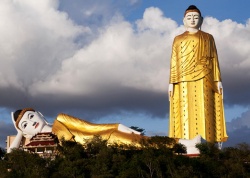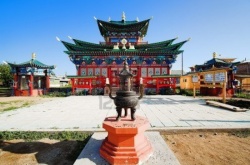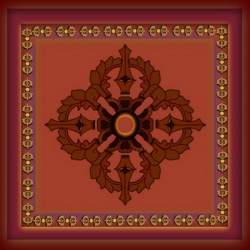Serkong Rinpoche's Further Qualities
The Extraphysical Powers of Rinpoche’s Father, Serkong Dorjey-chang
Serkong Rinpoche never claimed himself to be a yogi or to have any special powers. If we wanted an example of someone who did, he said we did not need to look only to the remote past. His father, Serkong Dorjey-chang, was a clear example. As a monk at Ganden Jangtsey Monastery, his father had attained the stage of anuttarayoga tantra at which he could practice special yoga techniques with a consort to reach the deepest level of mind.
This advanced point on the complete stage requires full mastery of the subtle energy system, with total control over both internal and external matter and energy. His vows of celibacy would normally prohibit him from such practice.
When His Holiness the Thirteenth Dalai Lama asked for proof of his attainment, Serkong Dorjey-chang tied a yak horn into a knot and presented it. Convinced, the Thirteenth Dalai Lama permitted Serkong Dorjey-chang to keep his monastic holdings while practicing at this level. Rinpoche matter-of-factly mentioned that they kept this horn in his home as a child.
Serkong Dorjey-chang was widely recognized as an incarnation of the eleventh-century translator Marpa. Serkong Rinpoche, in turn, was born to carry on his father’s lineages and was seen as the incarnation of Marpa’s famous son, Darma-dodey. Yet, not once did Rinpoche ever mention this to me, nor did he ever compare himself to his father. Nevertheless, despite Rinpoche’s silence, it was obvious to those close to him that he too had control over his subtle energy-winds and had extraordinary powers.
The way Rinpoche could fall asleep at will gave some indication of this. Once Rinpoche had an electrocardiagram taken as part of a medical examination in Madison, Wisconsin. Rinpoche was energetic and alert when he laid down for the test. Yet, when the doctor told Rinpoche to relax, within a few seconds he was snoring.
Rinpoche’s Own Extrasensory Abilities
Rinpoche’s extrasensory abilities to know the future could be seen from several examples. Rinpoche was not only one of His Holiness’s teachers, but also occasionally instructed several members of His Holiness’s family, including his mother. Rinpoche would normally never visit the Venerable Mother unless he made a formal appointment, as protocol demanded. Yet just before the Venerable Mother passed away, Rinpoche, sensing her situation, broke protocol and unexpectedly paid his last visit to her.
Once Rinpoche was teaching at Vajrayogini Institute in Lavaur, France, and had a few days break before leaving for Paris. I wished to go on ahead to visit with friends and someone had offered me a ride. When I asked permission to go to Paris on Sunday, Rinpoche said, "Very good, you are going to Paris on Monday." When I replied, "No, no. I am going tomorrow, on Sunday," Rinpoche repeated, "Very good, you are going on Monday." I then asked, "Is there something wrong with going on Sunday? Should I postpone and go on Monday instead?" Rinpoche laughed and said, "No, no. It hardly matters."
I then left for Paris on Sunday. Halfway there, the car broke down. Since auto garages are closed in France on Sunday, we had to stay overnight in a small village. We had the car repaired Monday morning and, as Rinpoche had foreseen, I arrived in Paris later, on Monday.
Rinpoche sometimes demonstrated the ability to see things in the distance. One day in Dharamsala, the director of Tushita Retreat Center invited Rinpoche to lead a ritual. As the jeep approached the center, Rinpoche said, "Hurry! Go check in the shrine room! A candle has fallen!" When the director rushed inside, she found that a candle had indeed toppled over and a fire was about to begin.
Rinpoche not only sensed what type of karmic relation he had with people, but also occasionally showed that he knew many things about strangers without having to be told. Once, in Madison, Wisconsin, one of my old friends came to see Rinpoche for the first time. Although my friend acted perfectly normally, and neither he nor I ever mentioned to Rinpoche his marijuana habit, Rinpoche told my friend he must stop smoking the drug. It was damaging his development. Of all the Westerners whom Rinpoche met, my friend was the only person he ever advised about marijuana.
Skillful Ways of Helping People to Recognize and Work on Their Shortcomings
Although Rinpoche saw many detrimental habits and tendencies in others, he was always skillful in pointing out to people their mistakes and faults. Once, while Rinpoche was away in Nepal for a few months, I experienced personal difficulties with my work. We met again in Bodh Gaya where I was translating a discourse by His Holiness on Engaging in Bodhisattva Behavior. Instead of bluntly saying to me that the way I was handling my affairs was completely stupid, Rinpoche turned to the text I was translating. Thumbing through the pages, he pointed out several words and asked if I knew what they meant. The words referred exactly to the problems I was having. Rinpoche explained their full connotations, thereby indicating the course of action to remedy the situation.
Once a wealthy, elderly Swiss woman took Rinpoche by taxi to the fanciest, most expensive department store in Zurich. When Rinpoche left the store, he remarked that it contained not one item that anyone actually needed. He then asked the woman if they could take the trolley back to her house. It would be fun to see how people commonly traveled. Embarrassed, the woman had to admit that she had never ridden the trolley in her entire life and did not know how to use it or where to get off. In this way, Rinpoche very gently showed her the distance she had from ordinary life.
Another time, Rinpoche was invited to stay at a huge ornate mansion near Zurich in which the woman of the house felt very uncomfortable in such stuffy luxury. She preferred to live simply and down to earth. She prepared the oak-paneled library room for Rinpoche to sleep in, since it was the stateliest chamber in the house. Rinpoche took one look at it and insisted that he sleep on the screened-in sunporch instead. He told the woman how much he loved living in tents. Her sunporch reminded him of staying in one because of the beautiful view of the garden and of the lake below. In this way, he helped her to appreciate and enjoy the more simple pleasures her mansion afforded.
Versatility in Helping Others
Rinpoche helped others in whatever way was needed and possible. When giving in Pomaia, Italy, a permission ceremony for the practice of Yellow Tara, a Buddha-figure associated with gaining wealth, Rinpoche asked a poor Italian artist to paint the picture of this figure for the ritual. Doing so would establish a strong karmic link for this artist to receive the benefits of prosperity from this meditation practice. At another occasion at the same center, Rinpoche gave a small offering of money to a young man whose parents’ home had recently been robbed. The gift would serve as an auspicious beginning for his family to restore their wealth. To Alan Turner, a close British disciple who had no interest or confidence in his ability to learn Tibetan, Rinpoche gave the oral transmission of the Tibetan alphabet to plant an imprint for some future date. And, when I had reached a plateau in my study of Tibetan and was not progressing any further, Rinpoche began to go through the Tibetan dictionary with me and have me write sentences with each word.
Rinpoche was also a supreme diplomat. He said always to accept whatever someone sincerely offers, especially if our refusal would hurt the person’s feelings and our acceptance would cause no harm. Thus, although Rinpoche did not like anything sweet, he would enthusiastically eat a piece of cake if someone baked it especially for him. In fact, if it would benefit the person’s self-confidence, Rinpoche would ask Ngawang to write down the recipe.
Above all, Rinpoche was extremely open-minded and versatile. No matter what the denomination of the Buddhist center that invited him – Kagyu, Nyingma, Sakya, Gelug, Zen, or Theravada – he would teach in the style of that particular tradition. This flexibility extended also beyond the bounds of Buddhism. Once, in Milan, Italy, a woman with a Catholic background asked, "Now that I have taken refuge and both bodhichitta and tantric vows, is it wrong for me to go to church?" Rinpoche replied, "There is nothing wrong. If you are focused on the teachings of love and compassion from another religion, aren’t you going in the same direction as your refuge and vows?"



